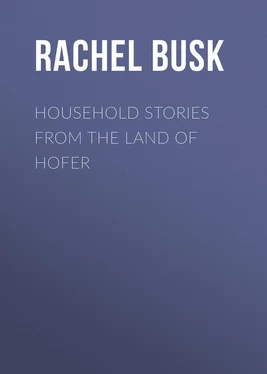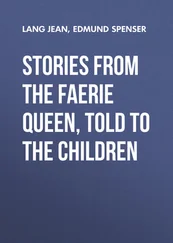Rachel Busk - Household stories from the Land of Hofer
Здесь есть возможность читать онлайн «Rachel Busk - Household stories from the Land of Hofer» — ознакомительный отрывок электронной книги совершенно бесплатно, а после прочтения отрывка купить полную версию. В некоторых случаях можно слушать аудио, скачать через торрент в формате fb2 и присутствует краткое содержание. ISBN: , Жанр: foreign_antique, foreign_prose, на английском языке. Описание произведения, (предисловие) а так же отзывы посетителей доступны на портале библиотеки ЛибКат.
- Название:Household stories from the Land of Hofer
- Автор:
- Жанр:
- Год:неизвестен
- ISBN:http://www.gutenberg.org/ebooks/44746
- Рейтинг книги:3 / 5. Голосов: 1
-
Избранное:Добавить в избранное
- Отзывы:
-
Ваша оценка:
- 60
- 1
- 2
- 3
- 4
- 5
Household stories from the Land of Hofer: краткое содержание, описание и аннотация
Предлагаем к чтению аннотацию, описание, краткое содержание или предисловие (зависит от того, что написал сам автор книги «Household stories from the Land of Hofer»). Если вы не нашли необходимую информацию о книге — напишите в комментариях, мы постараемся отыскать её.
Household stories from the Land of Hofer — читать онлайн ознакомительный отрывок
Ниже представлен текст книги, разбитый по страницам. Система сохранения места последней прочитанной страницы, позволяет с удобством читать онлайн бесплатно книгу «Household stories from the Land of Hofer», без необходимости каждый раз заново искать на чём Вы остановились. Поставьте закладку, и сможете в любой момент перейти на страницу, на которой закончили чтение.
Интервал:
Закладка:
R. H. Busk
Household stories from the Land of Hofer / or, Popular Myths of Tirol
INTRODUCTION
Something of the deep, strong attachment to their native mountains which is innate in the children of the Alps steals over me when I think of my pleasant journeyings in Tirol 1 1 It is common in England to speak of Tirol as “the Tyrol;” I have used the name according to the custom of the country itself.
.
Though it is a little, out-of-the-way country whose cry is seldom heard in the newspapers, though it exercises little influence in political complications, the character of its people is one which, next after that of our own, has a claim to our esteem and admiration. Hardy, patient, and persevering; patriotic and loyal to a fault; honest and hospitable to a proverb – they carry the observance of their religion into the minutest practice of every-day life; and there underlies all these more solid qualities a tender, poetical, romantic spirit which throws a soft halo round their ceaseless toil, and invests their heroic struggles for independence with a bright glow of chivalry.
Surrounded from their earliest years with living pictures of Nature’s choicest forms and colouring, they need no popular fiction to cultivate their imagination, no schools of design to educate their taste.
Shut out from the world’s ambitions by their pathless Alps, they have learned to see before them two aims alone, – to maintain the integrity and the sanctity of their humble homes on earth, and to obtain one day a place in that better Home above, to which the uplifted fingers of their sun-bathed mountain-peaks ever gloriously point.
The paramount claims on their hearts’ allegiance of the hearth and the altar are inseparably interwoven in their social code, and their creed scarcely knows of a distinction between Nature and Nature’s God.
At their mother’s knee they have learnt, every one, to prattle of their Father in heaven with as complete a realization of His existence as of that of their father on earth. Just as they receive their toil-won food and raiment as an earnest of the paternal care of the one, the change of the seasons, the sunshine and the rain, betoken to them as certainly that of the Other. They scarcely trace any line of demarcation between the natural and the supernatural; and earth and sky are not for them the veil which hides Divinity, but the very temple and shrine of the Godhead dwelling among His creatures.
Going forth in this simple faith through the pure, unfogged atmosphere which surrounds them, it is scarce to be wondered at if they can trace the guiding footprints and the unerring hand of Providence where for others are only chances and coincidences. Or that – like the faint outline of wished-for land revealing itself to the trained eye of the sailor, where the landsman sees but a hopeless expanse of sky and ocean – they should recognize a personal will and individuality in the powers which are the messengers to them of the good pleasure of Heaven, in the germination of fruit and grain, in the multiplication of their flocks and herds; or of the envious malice of the Evil One, in the wind and the lightning, the torrent and the avalanche, destroying the work of their hands.
It is necessary to bear this well in mind, or we shall not appreciate the delights which their fantastic tales have in store for us. We must learn to realize that this way of viewing things has created a nomenclature, almost a language, of its own.
When the boisterous blast sweeps through their valleys, scattering the scent of the wild game, and driving them far out of their reach, they say it is the Wilder Jäger 2 2 The name for “the wild huntsman” in North and South Tirol.
, the Beatrìk 3 3 The Beatrìk of the Italian Tirol is, however, a milder spirit than the Wilder Jäger of the northern provinces. He is also called il cacciatore della pia caccia , because he is supposed only to hunt evil spirits.
, or the Nachtvolk 4 4 The name in Vorarlberg.
, on his chase. Their restless energies, pent up within the shelter of their rattling walls and casements, invest him with a retinue of pitiless followers and fiery-eyed hounds – while the fate of some who have ventured out while he is said to be abroad, blown over precipices or lost in crevasses, is expressed by the fancy that his train is closed by a number of empty pairs of shoes, which run away with those who come within his influence.
When the bright beams of sun and moon enliven their landscape, or fructify their seed, or guide their midnight way, they fable of them as beautiful maidens with all sorts of fanciful names derived from associations as old as the world: Perahta , brightness, daughter of Dagha , the daylight – hence, also, Perchtl and Berchtl. In other localities, Holda or Hulda ; in others again, they are known as Angane , and Enguane , the Saligen Fraüelein , Nornen , Zarger Fraüelein , and Weissen Fraüelein . They say they smile on the overburdened peasant, beguile his labour by singing to him, show him visions of beautiful landscapes, bestow wonderful gifts – loaves which never diminish, bowls and skittles, charcoal and corn of pure gold; to the husbandman they give counsels in his farming; to the good housewife an unfailing store – bobbins of linen thread which all her weaving never exhausts; they help the youth or the maiden to obtain the return of the love they have longed for, and have some succour in store for every weary soul.
Such helpers the people recognize of the masculine gender, also, in the so-called Nörgl , Pechmannl , Pützl , Wiehtmännlein , Käsermännlein , and Salvanel ; for possibly, they say, not all the angels who rebelled with Lucifer may have been cast into the outer darkness. There may have been some not so evilly disposed themselves, but talked over and led astray by others; and such, arrested in their descent by a merciful reprieve, may have been only banished to the desolate and stony places of the earth, to tops of barren mountains and fruitless trees. Such as these might be expected to entertain a friendly feeling for the human beings who inhabit the regions which gave them shelter, and to be ready to do them a good turn when it lay in their way – lift weights, and carry burdens for them up the steep heights, and protect their wild game. And, also, it is not inconsistent with their nature to love to play them a mischievous trick full oft – make off with the provision of loaves prepared for the mowers; sit, while remaining invisible, on their sledges and increase their difficulty and confusion in crossing the mountain-paths lost in snow; entice them into the woods with beseeching voices, and then leave them to wander in perplexity; overturn the farm-maids’ creaming-pans; roll the Senner’s cheeses down the mountain sides.
Worse tricks than these are those of the Wilder Mann . When the soil is sterile and ungrateful; when any of the wonted promises of nature are unfulfilled; when the axe of the lonely woodman rebounds from the stubborn trunk and wounds him; when the foot of the practised mountain-climber fails him on the crisp snow, or the treacherously sun-parched heather; when a wild and lawless wight (for such there are even in Tirol, though fewer, perhaps, than elsewhere) illtreats the girl who has gone forth to tend her father’s flock upon the mountains, trusting in her own innocence and Heaven’s help for her protection – it is always the Wilder Mann – in some places called the Wilder Jörgel , in others, the Lorg , the Salvang or Gannes , the Klaubaut or Rastalmann , in Vorarlberg, Fengg , Schrättlig , Doggi , and Habergâss – to whose account the misfortune or the misdeed is laid. His female counterpart is called Trude and Stampa , and the Langtüttin .
Читать дальшеИнтервал:
Закладка:
Похожие книги на «Household stories from the Land of Hofer»
Представляем Вашему вниманию похожие книги на «Household stories from the Land of Hofer» списком для выбора. Мы отобрали схожую по названию и смыслу литературу в надежде предоставить читателям больше вариантов отыскать новые, интересные, ещё непрочитанные произведения.
Обсуждение, отзывы о книге «Household stories from the Land of Hofer» и просто собственные мнения читателей. Оставьте ваши комментарии, напишите, что Вы думаете о произведении, его смысле или главных героях. Укажите что конкретно понравилось, а что нет, и почему Вы так считаете.












